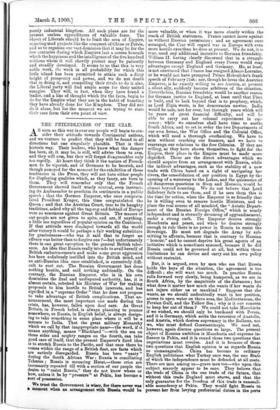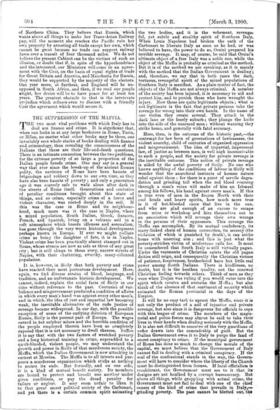THE FRIENDLINESS OF THE CZAR.
AS soon as this war is over our people will begin to con- sider their attitude towards Continental nations, and we venture to predict that they will be found in all directions but one singularly placable. That is their historic way. Their leaders, who know what the danger has been, or, it may be, is still, will advise them to arm, and they will arm, but they will forget disagreeables only too rapidly. At heart they think it the nature of French- men to be viperish, and of Germans to be boorish, and though annoyed for the moment by the exhibition of those tendencies in the Press, they will not hate either people for displaying qualities which, as they fancy, are born in them. They will remember only that the French Government showed itself wisely neutral, even instruct- ing its Ambassador to proclaim its sentiments in a public speech ; that the German Emperor, who once congratu- lated President Kruger, this time congratulated the Queen ; and that the Austrian Court, true to its haughty traditions, asked why all the tag-rag and bobtail of Europe were so venomous against Great Britain. The masses of our people are not given to spite, and are, if anything, a little too regardless of popular opinion on the Continent. If that attitude were displayed towards all the world after victory it would be perhaps a fair working substitute for graciousness—who was it said that to forget an offence was better than to forgive one ?—but unfortunately there is one great exception to the general British toler- ance. An idea that Russia really intends to avail herself of British embarrassments and make some great aggression has been sedulously instilled into the British mind, and an anti-Russian idea once established, is excessively diffi- cult to root out. The Russian Government has done nothing hostile, and said nothing unfriendly. On the contrary, the Russian Emperor, who is in his own dominions the final and undisputed authority, has, it is almost certain, rebuked his Minister of War for making proposals to him hostile to British interests, and has signified in a "supreme Order" that he does not propose to take advantage of British complications. That an- nouncement, the most important one made during the crisis, has, however, fallen upon deaf ears. As Great Britain, in French belief, is always planning to pounce somewhere, so Russia, in English belief, is always design- ing to take something in some place where it will be a menace to India. That the great military Monarchy which we call by that inappropriate name—the word, if it means anything, means "Blackland "—with the sea on three sides and mighty ranges on the fourth, can take good care of itself, that the present Emperor's fixed idea is to stretch Russia to the Pacific, and that once there he comes within the range of a. British fleet, are facts which are entirely disregarded. Russia has been " nasty " during the South African War ; Russia is conciliating Teheran ; Russia is menacing Herat,—these cries are incessantly repeated till with a section of our people the desire to "resist Russia," they do not know where or how, unless it be by "pressure" at Pekin, has become a sort of possession.
We trust the Government is wiser, for there never was moment when an arrangement with Russia would be more valuable, or when it was more clearly within the reach of British statesmen. France cannot move against us without Russian permission ; and an agreement once arranged, the Czar will regard war in Europe with even more hostile eyes than he does at present. We do not, it is true, need any additional incentive to German friendship, William II. having clearly discerned that in a struggle between Germany and England every Power would reap advantages except England and Germany. He, at least, is not convinced that I'rance has resigned Alsace-Lorraine, or he would not have prompted Prince Hohenlohe's frank speech of February 21st; nor, though he loves the Austrian Emperor, is he exactly willing to see Austria, at present a silent ally, suddenly become arbitress of the situation. Nevertheless, Russian friendship would be another reason for German justice to England, at least until that Fleet is built, and to look beyond that is to prophesy, which, as Lord Elgin wrote, is for democracies unwise. India would be safe, not for ever, but through years which will be years of great financial difficulty, and will be able to carry out her colossal experiment in cur- rency; while we ourselves shall have time to soothe South Africa, and to set in order the two Departments of our own house, the War Office and the Colonial Office, which will need a thorough overhauling. We have to arm without crushing our finances, and we have to rearrange our relations to the free Colonies. If they are willing, as they have shown themselves, to fight for the Empire, their place in the Empire must be made more dignified. Those are the direct advantages which we should acquire from an arrangement with Russia, while the indirect advantages, such as the stability of a new trade with China based on a right of navigating her rivers, the consolidation of our position in Egypt by the opening of a waterway to the Lakes, and the quiescence of all dangerous questions in Siam and Morocco, would be almost beyond counting. We do not believe that Lord Salisbury fails to see them, and if he sees them this is the time for action, when the Emperor is so friendly that he is willing even to remove hostile Ministers, and to place the real source of all mischief, the " Asiatic Depart- ment of the Russian Foreign Office," which is nearly independent and is eternally dreaming of aggrandisetnent, under a strong curb. The Emperor desires strongly Manchuria and peace, and when he desires strongly enough to rule there is no power in Russia to resist the Sovereign. He must not degrade the Army by sub- mitting to affronts, because that is contrary to Russian honour," and he cannot deprive his great agents of an initiative which is sometimes misused, because if he did Russia could not be governed at all, but within those limitations be can devise and carry out his own policy without restraint.
But, it is argued, even by men who see that Russia holds the keys of the situation, the agreement is too difficult ; she will want too much. In practice Russia rolls forward very slowly, being hampered, as we are in South Africa, by the magnitude of the distances ; but what does it matter how much she wants if her wants do not injure either us or mankind ? Suppose that she wants, as we should undoubtedly want in her position, access to open water on three seas, the Mediterranean, the Persian Gulf, and the Yellow Sea ; why is it our concern to keep her out of them ? We could not take Manchuria if we wished, we should only be burdened with Persia., and it is Germany, which seeks the reversion of Anatolia, and Austria, which desires supremacy in the Balkans, not we, who must defend Constantinople. We need not, however, again discuss questions so large. The present object of Russian ambition is Manchuria and supreme in- fluence in Pekin, and it is round those two questions that negotiations must revolve. And it is because of those two questions that English opinion is as regards Russia so unmanageable. China has become to ordinary English politicians what Turkey once was, the one State of which the independence must be defended at all costs. There are men among us—grave men too—who upon this subject scarcely appear to be sane. They believe that the trade of China is the one trade of the future, that without this trade England must starve, and that the only guarantee for the freedom of this trade is unassail- able ascendency at Pekin. They would fight Russia to prevent her from levying preferential duties in the ports of Northern China. They believe that Russia, which wants above all things to make her Trans-Asian Railway pay, will the moment she reaches the Pacific ruin her own property by arresting all trade except her own, which cannot be great because no trade can support railway fares over a transit of four thousand miles. We do not believe the present Cabinet can be the victims of such an illusion, or doubt that if, in spite of the hypochondriacs and the interested, our Ministers will come to an agree- ment with the Czar, on the basis of equal rights of trade for Great Britain and America, and Manchuria for Russia, they would be supported by the majority of the electors. One year more, at furthest, and England will be un- opposed in South Africa, and then, if we read our people aright, her desire will be to have peace for at least ten years. The greatest obstacle to that is the inveterate prejudice which refuses even to discuss with a friendly Czar the agreement which would secure it.







































 Previous page
Previous page